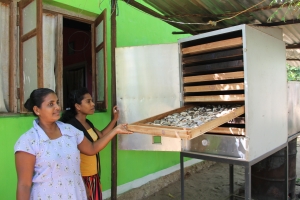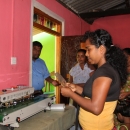New method, better income
Modern technique for fish drying brings better income for women in Sri Lanka
Location: Panama, Sri Lanka. 12th Jun 2015
Women in the local community are engaged in sun drying the excess fish which is a labour intensive process, subject to losses due to fickle weather conditions. As the process is difficult to control, the end product is of variable quality and subject to microbial contamination.
To address this problem, Mangroves for the Future (MFF) and the Green Movement of Sri Lanka (GMSL) introduced a fish preservation method, using dehydrators, to 30 women beneficiaries from Abeysinghapura and Shastrawela villages in the Panama district.
Dehydrators are operated using sawdust and electricity is used only to kick-start. Dehydrators create a stable drying environment that is not dependent on human and natural factors, and the production cost over time is reported to be 20% lower than sun drying.
Using the new technique, the household income increased by 25% (the monthly income is around LKR 1,800). The women are also able to process fish under more hygienic conditions, and 15 kg of raw fish can be dried and ready for marketing in just four hours. The conventional method to dry the same quantity would have taken three days. As a bonus, the dehydrated fish products contain less salt than other dried fish available in the market.

